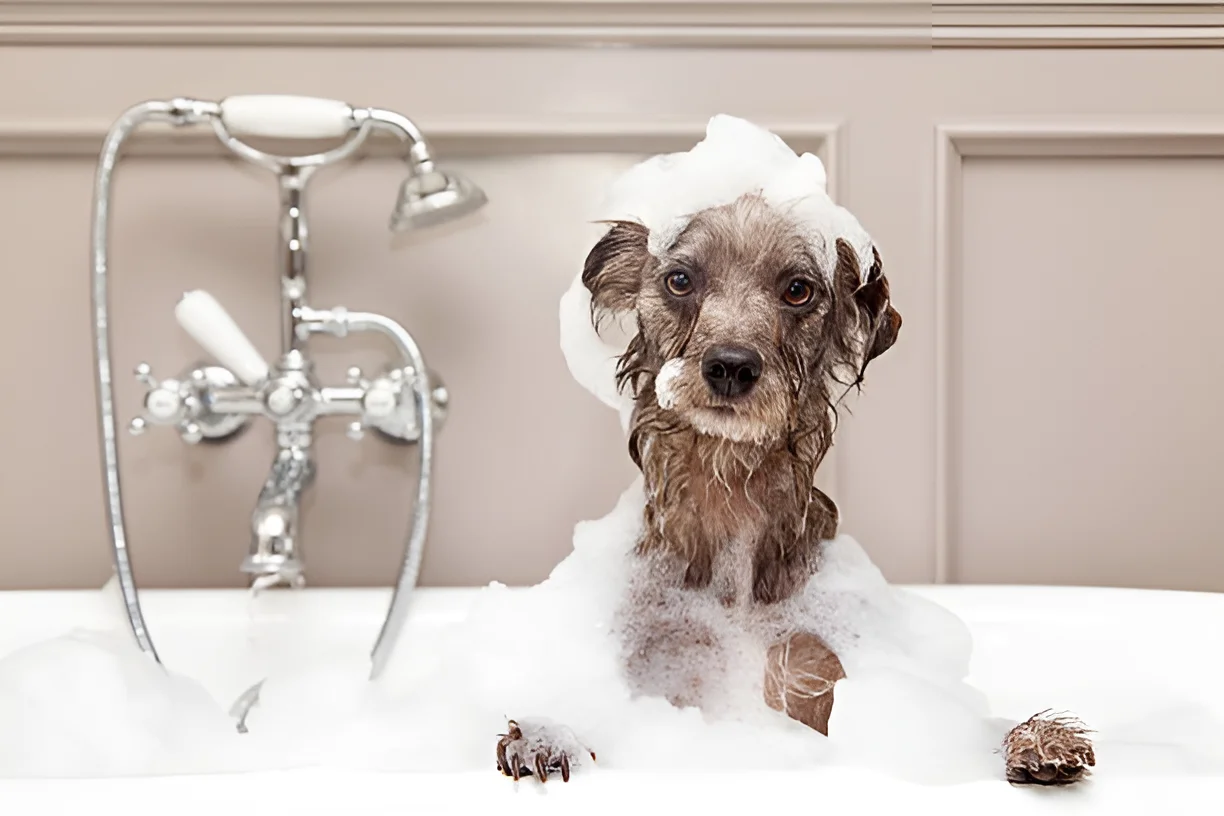If a dog eats Irish Spring soap, it may experience gastrointestinal upset, including vomiting, diarrhea, and abdominal pain. Dogs are naturally curious creatures, often exploring their environment with their mouths. This can sometimes lead to them ingesting things they shouldn’t, such as household items like soap. Irish Spring soap, known for its distinctive green color and strong fragrance, can be particularly enticing to dogs. This comprehensive guide will explore the potential effects of Irish Spring soap on dogs, what to do if your dog ingests it, and how to prevent such incidents in the future.
Understanding the Ingredients in Irish Spring Soap
Irish Spring soap is a popular brand of bar soap that contains a variety of ingredients, some of which can be harmful to dogs if ingested. Key ingredients include:
1. Sodium Tallowate: Derived from animal fat, this ingredient is used to create the soap’s lather. While not toxic, it can cause gastrointestinal upset if ingested in large quantities.
2. Sodium Cocoate: Derived from coconut oil, this ingredient also contributes to the soap’s lathering properties. It can cause digestive issues if consumed in significant amounts.
3. Fragrance: The strong fragrance of Irish Spring soap is due to a combination of synthetic and natural scents. These can be irritating to a dog’s gastrointestinal tract.
4. Glycerin: A common ingredient in many soaps, glycerin can cause vomiting and diarrhea in dogs if ingested in large amounts.
5. Titanium Dioxide: Used to give the soap its white color, titanium dioxide is generally considered safe in small amounts but can cause irritation if ingested.
Symptoms of Soap Ingestion in Dogs
If your dog eats Irish Spring soap, it may exhibit a range of symptoms depending on the amount ingested and the size of the dog. Common symptoms include:
- Vomiting: One of the most immediate reactions to soap ingestion is vomiting. This is the body’s way of expelling the irritant.
- Diarrhea: Ingesting soap can lead to diarrhea as the gastrointestinal tract becomes irritated.
- Abdominal Pain: Your dog may show signs of discomfort, such as whining, restlessness, or a hunched posture.
- Drooling: Excessive drooling can occur as a response to the irritation caused by the soap.
- Lethargy: Your dog may become unusually tired or weak due to the gastrointestinal upset.
- Choking or Gagging: If your dog ingests a large piece of soap, it could cause choking or gagging.
What to Do If Your Dog Eats Irish Spring Soap
If you suspect or know that your dog has ingested Irish Spring soap, it’s important to act quickly to minimize any potential harm. Here are the steps you should take:
1. Assess the Situation: Determine how much soap your dog has ingested and whether they are showing any immediate symptoms such as vomiting or choking.
2. Remove Access: Ensure that your dog cannot access any more soap. Remove any remaining pieces from their reach.
3. Do Not Induce Vomiting: Do not attempt to induce vomiting unless instructed by a veterinarian. Inducing vomiting can sometimes cause more harm than good.
4. Contact Your Veterinarian: Call your veterinarian for advice. Provide them with information about the type and amount of soap ingested, as well as any symptoms your dog is experiencing.
5. Monitor Your Dog: Keep a close eye on your dog for any signs of distress or worsening symptoms. Follow your veterinarian’s instructions carefully.
6. Provide Water: Offer your dog small amounts of water to help dilute the soap in their stomach. Do not force them to drink.
Preventing Soap Ingestion
Preventing your dog from ingesting soap and other harmful substances is crucial for their safety. Here are some tips to help prevent such incidents:
1. Store Soap Safely: Keep soap and other household items out of your dog’s reach. Store them in cabinets or on high shelves.
2. Supervise Your Dog: Supervise your dog when they are in areas where they might encounter soap, such as the bathroom or kitchen.
3. Use Dog-Proof Containers: Consider using dog-proof containers for storing soap and other potentially harmful items.
4. Training: Train your dog to avoid chewing on non-food items. Use positive reinforcement to encourage good behavior.
5. Provide Chew Toys: Offer your dog plenty of safe chew toys to satisfy their natural chewing instincts.
Conclusion
If a dog eats Irish Spring soap, it may experience gastrointestinal upset, including vomiting, diarrhea, and abdominal pain. While small amounts may only cause mild symptoms, larger quantities can lead to more serious health issues. It’s important to act quickly if your dog ingests soap and to contact your veterinarian for guidance. By taking preventive measures and ensuring that soap and other household items are stored safely, you can help protect your dog from accidental ingestion.
The photo featured below the post headline is Credit: adogslifephoto/istockphoto
I hope you find this post helpful and informative. If Yes’ feel free to share it with your friends!
Frequently Asked Questions
Is Irish Spring soap toxic to dogs?
While not highly toxic, Irish Spring soap can cause gastrointestinal upset and irritation if ingested by dogs. Symptoms may include vomiting, diarrhea, and abdominal pain.
What should I do if my dog eats soap?
If your dog eats soap, remove any remaining soap from their reach, do not induce vomiting, and contact your veterinarian for advice. Monitor your dog for any signs of distress.
Can soap cause long-term health issues in dogs?
Ingesting large amounts of soap can potentially cause more serious health issues, such as gastrointestinal blockages. It’s important to seek veterinary care if your dog ingests soap.
How can I prevent my dog from eating soap?
Store soap and other household items out of your dog’s reach, supervise your dog in areas where they might encounter soap, and provide plenty of safe chew toys.

